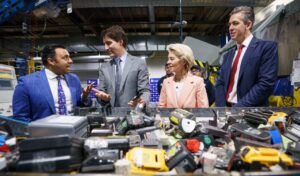After tripling its North American battery recycling capacity in 2022, Canada’s Li-Cycle plans to open its largest-ever facility this year in Germany — with much more in the works

Prime Minister Justin Trudeau and European Commission President Ursula von der Leyen with Li-Cycle CEO Ajay Kochhar (left) and executive chairman Tim Johnston (right) at Li-Cycle’s Spoke facility in Kingston, Ont. Photo: Adam Scotti via Li-Cycle.
After tripling its North American battery recycling capacity in 2022, Canada’s Li-Cycle plans to open its largest-ever facility this year in Germany — with much more in the works
Editor’s Note: This story was updated on March 27 to include the announcement of plans for a new spoke facility in France.
Toronto-based lithium-ion battery recycler Li-Cycle Holdings Corp. brought together a pair of prominent world leaders in Kingston earlier this month — the latest signal of its growing global EV battery recycling ambitions.
On Mar. 8, Prime Minister Justin Trudeau and Ursula von der Leyen, president of the European Commission, toured the company’s first, and only, Canadian recycling facility.
Li-Cycle’s Kingston plant opened in 2019 and now recycles 5,000 tonnes of batteries a year. The company has since opened three other recycling facilities in New York, Arizona and Alabama — each one another “spoke” in its two-stage “Spoke and Hub” vertically integrated recycling strategy. Combined, they have a capacity to process 51,000 tonnes of battery materials per year.
“As a Canadian company, we were honoured to have the privilege and opportunity to showcase our innovative and sustainable Spoke technology to Prime Minister Trudeau and President von der Leyen,” said Ajay Kochhar, co-founder and CEO of Li-Cycle, in a press release.
European expansion
Von der Leyen’s visit and photo-op with Trudeau was more than just a showcase. It was also a statement that Li-Cycle has even bigger plans — in which Europe will play a key role.
Later this year, the company expects to open its largest battery recycling facility to date: a processing plant in Germany that will be able to recycle 30,000 tonnes of lithium-ion batteries per year.
Two other European spoke facilities are also in the works. The first, in Norway, is on track to start operating in 2024. The other, announced in late March, will be in France, as part of a newly signed partnership with KION Group, a global provider of industrial trucks.
“As we continue to grow our highly scalable business model, we plan to replicate our success in North America in Europe,” a Li-Cycle spokesperson said in an email interview with Electric Autonomy. “Li-Cycle’s Spoke in Germany will be a key commercial development for Li-Cycle in the European region as we begin to entrench ourselves in that market.”
But that’s not all. Across Lake Ontario, in Rochester, N.Y., Li-Cycle is also on track to begin commissioning its first “hub” facility later this year. That operation that will take recycled product (“black mass”) from its spoke facilities and process it to produce battery-grade materials.
In late February, the U.S. Energy Department announced a US$375-million loan to Li-Cycle to help make that a reality.
When operational, the Rochester hub is expected to be the first source of recycled battery-grade lithium carbonate in North America. It will have a processing capacity of 35,000 tonnes of black pass per year, equivalent to approximately 90,000 tonnes or 18 gigawatt-hours of lithium-ion batteries.
All eyes on battery recycling
The business case for all this activity is hard to dispute.
Used lithium-ion batteries are composed of important metals, such as lithium, nickel and cobalt, that can be recycled and reused in the creation of new batteries.
As the usage of EVs continues to increase in the world, creating more and more used batteries, the importance of EV battery recycling — and recyclers and materials producers like Li-Cycle — is also expected to grow.
“The need for lithium-ion battery recycling is an urgent global challenge, there will be a ‘tsunami’ of end-of-life batteries that will need to be recycled in a safe and environmentally friendly manner — it’s just a matter of when,” said the Li-Cycle spokesperson.
The infrastructure Li-Cycle is establishing now will ensure it’s ready when that tsunami hits. Until then, it is lining up deals with automakers like General Motors to secure manufacturing scrap from their battery factories and processing other types of battery materials along with used EV batteries in its new plants.
The facilities Li-Cycle opened in Arizona and Alabama in 2022 tripled its North American EV battery recycling capacity. Notably, both facilities use technology to process full EV battery packs without shredding them or creating any wastewater.
That same processing expertise will also be introduced in a new Kingston facility that will replace Li-Cycle’s current plant and double its Canadian processing capacity. That plant is also expected to have research and training facilities. Li-Cycle hopes to being work on that new facility later this year.
Overall revenue is still modest, however. In fiscal 2022, ended Oct. 31, Li-Cycle posted $13.4 million in revenue.
Connections with Germany
Anyone following the growth of the EV battery value chain in Canada knows that Li-Cycle’s foray into Germany isn’t the only recent venture linking the two countries.
On Mar. 13, Volkswagen announced that its first North American gigafactory will be located in St. Thomas, Ont.
The facility is scheduled to be operational in 2027, and play a major role in the auto manufacturer’s $20-billion pledge to build its own EV batteries.
Li-Cycle says it is excited to see Volkswagen’s plans, and the battery ecosystem continue to grow in Canada.
“As automakers are accelerating their EV production goals in Canada, they will need reliable, domestic supply of battery materials,” the spokesperson said.
“Li-Cycle’s recycling technologies and infrastructure are essential to support their growth.”






